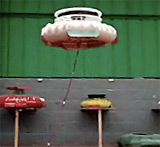I have a confession to make. When I visited the Forbidden City in Beijing last month, I went to a little café there.

Found while emptying out my wallet.
I have a confession to make. When I visited the Forbidden City in Beijing last month, I went to a little café there.

Found while emptying out my wallet.
Want to edit binary files on your Mac? Hex Fiend looks neat.
At a recent business meeting, an acquaintance referred to “The Flying Saucer Company of Peterborough”. I assumed that this hypothetical company was one he had plucked out of the air and given an amusing name for the purposes of illustrating his point.
 But no, there really is a company making flying saucers in Peterborough. Small ones, at present, and battery powered, but the little video clip on their front page gives the impression that they’ve managed to make them work pretty well. Stability has been one of the problems to plague similar projects in the past.
But no, there really is a company making flying saucers in Peterborough. Small ones, at present, and battery powered, but the little video clip on their front page gives the impression that they’ve managed to make them work pretty well. Stability has been one of the problems to plague similar projects in the past.
Their site says:
The craft will be most useful in urban environments, where its ability to hover and fly close to and within buildings will enable close quarter surveillance and intelligence gathering. Having no exposed rotating parts, brushes with walls etc., do not compromise the craft’s flight.
There was an article a couple of months ago in the Daily Mail which includes some more information and links to a video clip giving a better idea of how it works. Of course, being the Mail, they focus on the fact that the US military is interested, and how the inventor “set about turning his workshops into his own mini-Area 51s”!
Good God. I can’t believe I actually referred readers to the Daily Mail. Standards are slipping. I apologise. Will attempt to rectify.
Tony Blair has been speaking about the media, and how it has changed in the last few years. Extract:
[T]he media are facing a hugely more intense form of competition than anything they have ever experienced before.
They are not the masters of this change but its victims. The result is a media that increasingly and to a dangerous degree is driven by “impact”. Impact is what matters. It is all that can distinguish, can rise above the clamour, can get noticed.
Impact gives competitive edge. Of course the accuracy of a story counts. But it is secondary to impact. It is this necessary devotion to impact that is unravelling standards, driving them down, making the diversity of the media not the strength it should be but an impulsion towards sensation above all else.
Broadsheets today face the same pressures as tabloids; broadcasters increasingly the same pressures as broadsheets.
The audience needs to be arrested, held and their emotions engaged. Something that is interesting is less powerful than something that makes you angry or shocked. The consequences of this are acute.
First, scandal or controversy beats ordinary reporting hands down. News is rarely news unless it generates heat as much as or more than light. Second, attacking motive is far more potent than attacking judgement. It is not enough for someone to make an error. It has to be venal. Conspiratorial.
…
Fourth, rather than just report news, even if sensational or controversial, the new technique is commentary on the news being as, if not more important than the news itself.
So – for example – there will often be as much interpretation of what a politician is saying as there is coverage of them actually saying it. In the interpretation, what matters is not what they mean; but what they could be taken to mean.
© Copyright Quentin Stafford-Fraser
Recent Comments